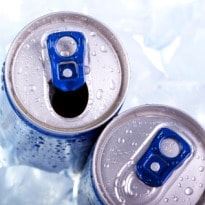Young adults and teenagers are constantly seeking something that gives them an instant energy boost and keeps them fueled through the night. And that's exactly what energy drinks have to offer. Energy drinks are hot-sellers, especially when paired with alcohol in night clubs. Health experts have questioned the side-effects of energy drinks time and again but the argument has so far been inconclusive. Now, a frightening study sheds light on the serious health hazards of consuming energy drinks. According to a research presented at the European Society of Cardiology (ESC) Congress 2014, excess consumption of energy drinks can lead to serious heart problems. (More: Consumption of energy drinks leads to unhealthy behaviour) Professor Milou-Daniel Drici, researcher and professor presented his study and stated, "Energy drinks are popular in dance clubs and during physical exercise, with people sometimes consuming a number of drinks one after the other. This situation can lead to a number of adverse conditions including angina, cardiac arrhythmia (irregular heartbeat) and even sudden death."
He added, "Around 96 per cent of these drinks contain caffeine, with a typical 0.25 litre can holding 2 espressos worth of caffeine. Caffeine is one of the most potent agonists of the ryanodine receptors and leads to a massive release of calcium within cardiac cells. This can cause arrhythmias, and also effect the heart's ability to contract and to use oxygen. In addition, 52 per cent of drinks contain taurine, 33 per cent have glucuronolactone and two-thirds contain vitamins." The study analysed adverse events that have been reported to the French Agency For Food Safety between 1 January 2009 and 30 November 2012. Cardiologists, psychiatrists, neurologists and 12 other specialists contributed to the study, and the ultimate findings were compared to data published in the scientific literature.Researchers found that consumption of 103 energy drinks in France increased by 30 per cent between 2009 and 2011 up to over 30 million litres. The leading brand made up 40 per cent of energy drinks consumed. During the two year period, 257 cases were reported to the agency, of which 212 provided sufficient information for food and drug safety evaluation.The experts found that 95 of the reported adverse events had cardiovascular symptoms, 74 psychiatric, and 57 neurological, sometimes overlapping. Cardiac arrests and sudden or unexplained deaths occurred at least in 8 cases, while 46 people had heart rhythm disorders, 13 had angina and 3 had hypertension.Drici said, "We found that 'caffeine syndrome' was the most common problem, occurring in 60 people. It is characterised by a fast heart rate (called tachycardia), tremor, anxiety and headache. Rare but severe adverse events were also associated with these drinks, such as sudden or unexplained death, arrhythmia and heart attack (myocardial infarction). Our literature search confirmed that these conditions can be related to consumption of energy drinks."With inputs from PTI
He added, "Around 96 per cent of these drinks contain caffeine, with a typical 0.25 litre can holding 2 espressos worth of caffeine. Caffeine is one of the most potent agonists of the ryanodine receptors and leads to a massive release of calcium within cardiac cells. This can cause arrhythmias, and also effect the heart's ability to contract and to use oxygen. In addition, 52 per cent of drinks contain taurine, 33 per cent have glucuronolactone and two-thirds contain vitamins." The study analysed adverse events that have been reported to the French Agency For Food Safety between 1 January 2009 and 30 November 2012. Cardiologists, psychiatrists, neurologists and 12 other specialists contributed to the study, and the ultimate findings were compared to data published in the scientific literature.Researchers found that consumption of 103 energy drinks in France increased by 30 per cent between 2009 and 2011 up to over 30 million litres. The leading brand made up 40 per cent of energy drinks consumed. During the two year period, 257 cases were reported to the agency, of which 212 provided sufficient information for food and drug safety evaluation.The experts found that 95 of the reported adverse events had cardiovascular symptoms, 74 psychiatric, and 57 neurological, sometimes overlapping. Cardiac arrests and sudden or unexplained deaths occurred at least in 8 cases, while 46 people had heart rhythm disorders, 13 had angina and 3 had hypertension.Drici said, "We found that 'caffeine syndrome' was the most common problem, occurring in 60 people. It is characterised by a fast heart rate (called tachycardia), tremor, anxiety and headache. Rare but severe adverse events were also associated with these drinks, such as sudden or unexplained death, arrhythmia and heart attack (myocardial infarction). Our literature search confirmed that these conditions can be related to consumption of energy drinks."With inputs from PTI
Advertisement








